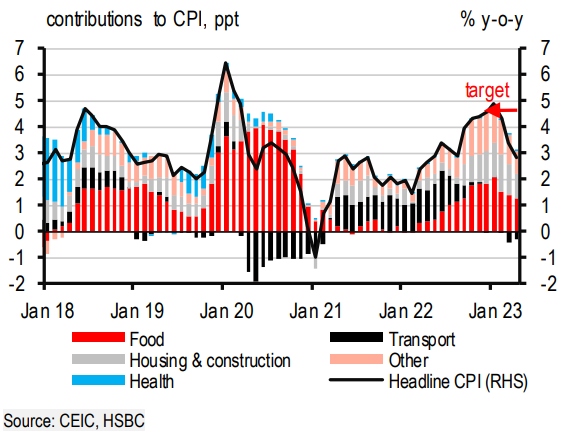Vietnam continues to face challenges in Q2/2023: HSBC
After a sluggish GDP performance in the first quarter this year, Vietnam is still not out of the woods yet. In particular, it has not seen the light at the end of the tunnel on the trade front, according to an HSBC report.

The report said as a country particularly exposed to the global trade cycle, external weakness has dampened Vietnam’s growth. After falling 12% year-on-year in the first quarter this year, exports continued their double-digit decline, falling 11.7% year-on-year in April.
HSBC said that the weakness continued to be broad-based, with key shipments such as textiles, footwear, smartphones and wooden furniture saw notable slumps. However, the only bright spot in April’s data was computer electronics, rising 5.4% year-on-year. That said, this was a one-off surprise due to base effects, rather than a reflection of the tech cycle bottoming out.
While leading indicators such as PMI showed some initial signs of stabilisation, it will still take some time until there is a meaningful rebound in the global electronics cycle. Vietnam is clearly not alone in this while peers such as Taiwan and Korea also continue to struggle in the current electronics doldrums.
Despite weakness in goods trade, services continue to provide some much-needed support. International tourist arrivals moved closer to one million in April, driven by a 70% month-on-month pick-up in Chinese tourists.
The positive recovery is thanks to easing flight constraints and China’s inclusion of Vietnam as a destination for its group tour resumption in mid-March. However, as a major tourist source with 30% share prior to the pandemic, the recovery pace of Chinese tourists remains gradual, reaching only 25% of the same period in 2019. For example, Korean tourists, another major source, have recovered to 77%.
While tourism can provide some partial support, its recovery will only be a slow process, and will not be enough to offset this year’s challenges. Indeed, growth headwinds can be seen through the lens of extremely sluggish credit growth.
Despite an annual credit growth target of 14-15% and two moves by the State Bank of Vietnam (SBV) to cut its key interest rates in March, loans only grew around 2% by mid-April, half of the growth of the same period in 2022, reflecting ongoing concerns of economic difficulties.
As a result, the authorities have introduced a series of support policies recently, including a VND120 trillion credit package for social housing, a 2 percentage point cut of VAT until end-2023 and plans to restructure some loans. In particular, there are initial signs of a relaxation in the policy stance towards the property sector, which has been facing a liquidity crunch since last October.
Despite slowing growth, inflation has been better behaved, offering some relief to policymakers. Headline inflation fell 0.3% month-on-month, translating into a benign year-on-year print of sub-3%, moving further away from the SBV’s 4.5% inflation ceiling. For one, food inflation momentum continued to ease, thanks to a decline of 1.6% month-on-month in pork prices (recall pork inflation has a sizeable impact on overall food inflation).
Meanwhile, energy prices saw a mixed picture. While transport costs rose marginally, due to higher oil prices, other energy inflation, such as electricity and gas, fell. That said, caution is still warranted on the supply-side of inflation. After all, OPEC’s decision to cut oil production and Vietnam Electricity's (EVN) proposed electricity price hike had not materialised by mid April.
All in all, Vietnam continues to face challenges in the second quarter 2023 after a tough first quarter economic performance. While it will likely see weak growth in the first quarter this year, the bank expects the services sector to receive a punchier boost and the trade tide to turn in the second quarter, lifting whole-year growth to 5.2% in 2023.
